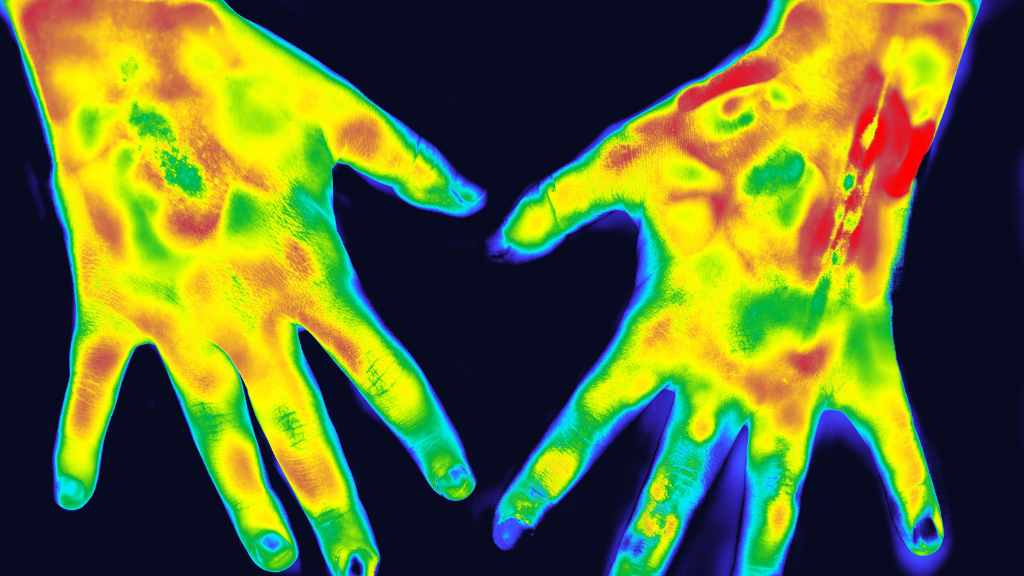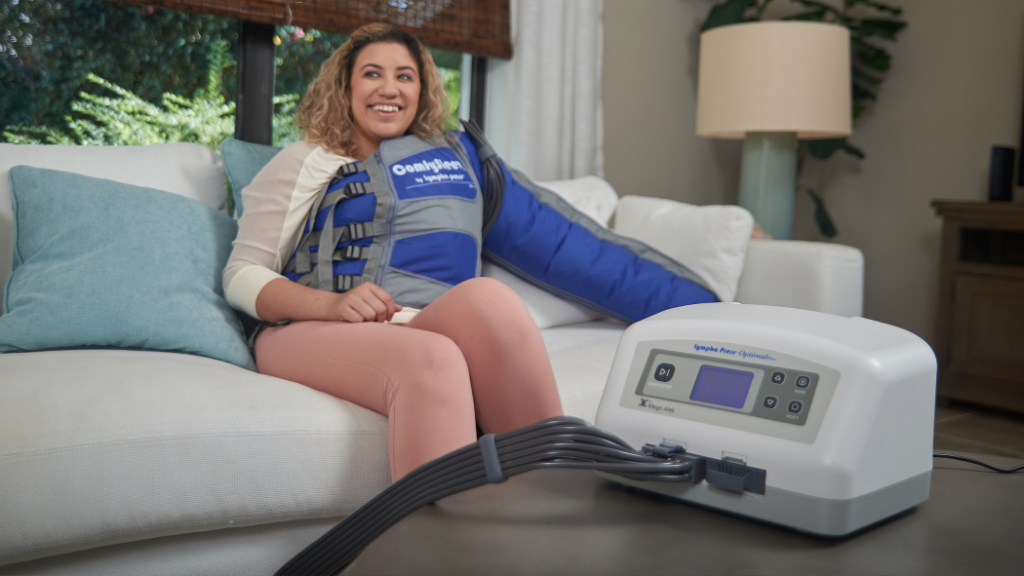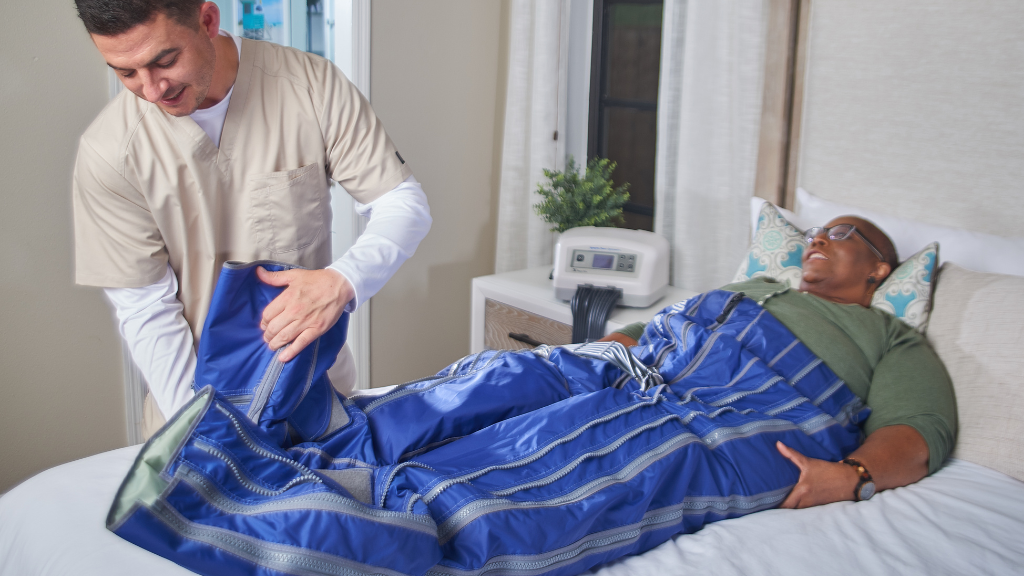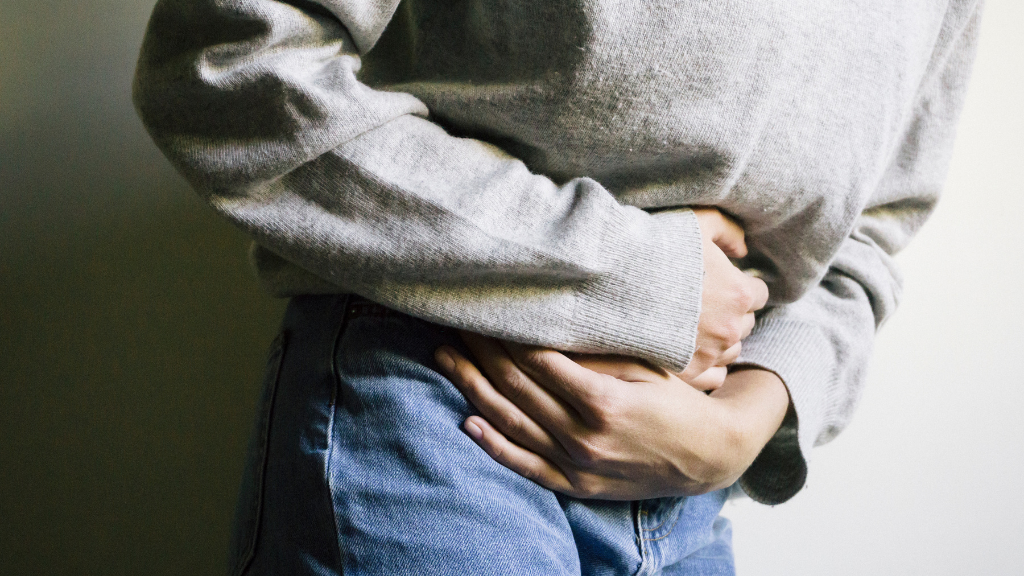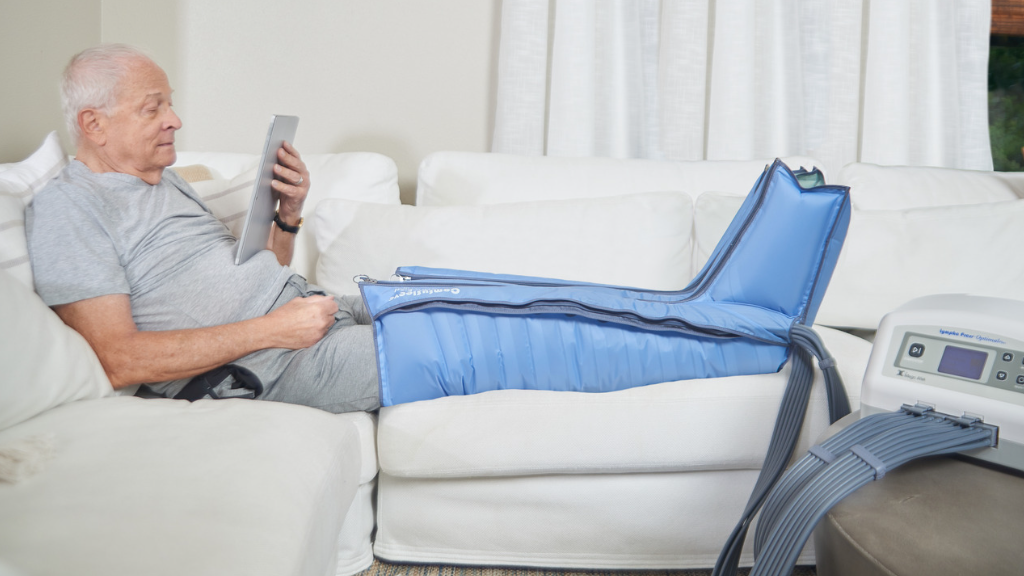No products in the cart.
Explore
Contact Us.
We're ready to help.
Looking for more information, or to be connected with your local representative?
We can help. Fill out our contact form to get started.

25
Dec
Lifestyle and Lymphedema: Impacts of Nutrition, Exercise, Sleep, and Stress
This is a 20-minute read.
When addressing lymphedema, the importance of self-care and a healthy lifestyle is often discussed regarding symptom management. However, with a plethora of self-care trends and fads available, practitioners and people living with lymphedema may be left wondering which approaches are best for lymphatic care. Lympha Press was proud to welcome speakers Dr. Leslyn Keith, OTD, OTR/L, CLT-LANA, and Robert Erkstam, OTR, CLT-LANA, to address this knowledge and practice gap by sharing their professional expertise in building successful lifestyle programs to support the health, wellness, and quality of life for people with lymphedema.
Dr. Leslyn Keith is an occupational and lymphedema therapist with over 20 years of experience treating lymphatic disorders. She is an instructor for Klose Training and Consulting and has authored two books on lymphatic conditions. Dr. Keith is the Director and President of Research for The Lipedema Project. Robert Erkstam is an occupational and lymphedema therapist with nearly 20 years of experience working as a certified lymphedema therapist. He is the owner of a private clinic in North Carolina that provides lymphedema care as well as health and wellness coaching.
Over the past few years, Dr. Keith and Erkstam have teamed up to collaborate in building an online lifestyle program for people living with lymphedema. In a recent Lympha Press Education Series webinar they shared some of the highlights of their program that, in collaboration with a patient’s physician, may support lymphedema management and quality of life.
A Paradigm Shift Toward the Pillars of Health
Many symptoms and complications of lymphedema or related health conditions can affect a person’s physical, mental, and socioemotional wellness. The compounded effect of these symptoms can significantly impact quality of life.
Erkstam and Dr. Keith present a holistic view of lymphedema therapy that includes evidence-based approaches that can address a multitude of lymphedema symptoms and complications. Their presentation begins by acknowledging the two phases of treatment taught in lymphedema care: the active treatment and maintenance/self-care phases. Their treatment paradigm situates these two phases within the context of healthy lifestyle practices. In other words, Erkstam and Dr. Keith suggest that the teaching of healthy lifestyle practices should complement and coincide with the usual acute and long-term management interventions.
These lifestyle practices are based on four interdependent pillars of health: nutrition, stress, physical activity, and sleep. Each pillar has a reciprocal effect on the other. Stress can influence nutrition choices, consistent physical activity can support sleep, and so on. These effects are also bidirectional, meaning they can “spiral up or spiral down” to either reinforce good habits or lead to a point of feeling stuck.
Getting Started with Nutrition
While there is reciprocity between each pillar, Dr. Keith and Erkstam suggest beginning with incremental nutritional changes. They begin by addressing a well-known cause of lymphedema: obesity. Obesity can exacerbate or contribute to lymphedema by 1) causing chronic inflammation and venous hyperpermeability, leading to increased fluid, and 2) creating mechanical obstructions of lymph flow.
While some practitioners may feel uncomfortable discussing obesity with their clients, Erkstam and Dr. Keith shared they found that most clients are eager to discuss their obesity and weight management strategies. Another benefit of being open to discussing obesity is recognizing that this is a treatable risk factor for lymphedema, unlike many of the other uncontrollable variables. The presenters hope that these observations and client interactions encourage more lymphedema specialists to initiate similar conversations.
Addressing obesity and lymphedema offers the opportunity to incorporate discussions about nutrition. Dr. Keith reminds the audience that making the right dietary choices can facilitate weight management to reduce or mitigate excess fluid and even improve other comorbid health conditions (i.e., high blood pressure, diabetes, etc.). Regarding dietary plans, Dr. Keith and Erkstam encourage ketogenic nutrition.
Ketogenic (or Keto) nutrition is defined as whole foods that are unprocessed, low in carbohydrates, contain healthy fats, and are adequate in protein. Dr. Keith reviewed the available literature to support the use of ketogenic diets for lymphedema management. The evidence suggests following keto principles may help reduce lymphatic swelling, support adequate lymph flow, encourage new vessel growth, and even reduce lymphedema symptoms including pain, fibrosis, and swelling.
Dr. Keith went on to emphasize that individualization of diet plans is essential, while first recognizing that nutritional plans for anyone, including people with lymphedema, must be safe. This means selecting food options that accommodate allergies or other health needs. Second, the plan must be sustainable. Considering client food preferences that work within a ketogenic approach will encourage consistency and long-term nutritional success. Examples of preference consideration may include choosing animal vs. plant-based options, preferred cultural dishes, or general tastes.
Overall, the speakers highlighted that being willing to discuss obesity, weight management, and diet in the context of lymphedema management can support the provider-client relationship and enhance lymphedema care for clients.
Reframing Exercise and Physical Activity
Physical activity is the second pillar in their lifestyle practices paradigm. Erkstam began by sharing the numerous, well-documented physical, social, and emotional health benefits of engaging in exercise: reduced pain, decreased inflammation, increased immune responsiveness, decreased risk of diabetes or Alzheimer’s, increased mood, and several more. But he also highlighted that, often, there are major misconceptions surrounding exercise and lymphedema. For example, some clients view exercise only as intense physical activity, or they may believe it is contraindicated with lymphedema.
Erkstam shared that lymphedema care providers need to take the time to debunk misconceptions, support clients in reframing their views and definitions, and grade activities to meet clients at the current stage of their exercise journey. This may include setting short-term goals for increasing physical activity, such as beginning with a daily 10-minute walk and increasing that time by 1-2 minutes each day. Providers may also spend time providing additional education, explaining that walking is a low-impact activity to support muscle pumping for lymphatic and cardiovascular health. It can even be as simple as providing at-home exercise options for a client who feels embarrassed or nervous about exercising in public.
While any physical activity is beneficial, Erkstam pointed out some exercises that are particularly favorable for people with lymphedema:
- Pool or water exercises. Standing in the water (usually near chest level) provides hydrostatic pressure similar to graduated compression and may even promote immersion diuretic effects, supporting the lymphatic system and function. Being in water also adds resistance to limb movements while reducing the impact of gravity, which helps some people be less fearful of falling while exercising.
- Resistance training (or anaerobic) exercises. Weight and resistance training facilitate muscle pump functions that support lymphatic health. These exercises should be done in addition to a cardio routine for short, intense durations to promote muscle building while protecting joints.
- Mobility exercises. Mobility and stretching exercises should be considered when designing exercises for lymphedema lifestyle programs to prevent injury and support soft tissue pliability.
Erkstam noted that the options for, and potential benefits of, exercise are endless. Mixing light cardio, resistance, and mobility activities into an exercise routine is optimal for clients living with lymphedema. Overall, the key is to encourage clients to do a little bit each day to build the habit, reap the benefits, and see the “spiral up” effects of consistent physical activity.
Supporting Adequate Sleep
The third pillar, sleep, has a significant impact on individual health and wellness. Good sleep is associated with improved mood, cognition, socialization, and overall health. Dr. Keith reminded us that, conversely, inadequate sleep is linked to several physical and socioemotional health concerns including elevated risk for serious medical conditions such as stroke and heart attack. Lack of sleep may also lead to weight gain, mental health concerns, impaired cognition, and more.
When coupled with lymphedema, these risks are amplified and could exacerbate lymphedema-related symptoms. Additionally, Dr. Keith shared new research that identified lymphatic vessels found to support brain and spinal cord health by removing toxins. Due to the natural cell shrinkage that occurs during sleep, these lymphatics function more efficiently at night. Without proper sleep, the lymphatic vessels may not be able to have time to fully perform this waste removal process, thus increasing the risk for neurodegenerative conditions, including Alzheimer’s and Parkinson’s disease.
However, Dr. Keith acknowledged that sleep can be difficult for people with lymphedema, finding high rates of client-reported sleep disruption. Research suggests that discomfort from lymphedema symptoms, overnight compression interventions, and comorbid conditions may increase a person’s chances of experiencing poor sleep. Dr. Keith encouraged lymphedema care providers to seek education on sleep disorders and interventions that may improve clients’ quality of sleep, such as knowing when to suggest a sleep study, breathing exercises, limb positioning for comfort, and other sleep hygiene techniques.
Addressing sleep is an integral part of supporting a holistic view of wellness and lymphedema lifestyle practices, as demonstrated by our speakers.
Resiliency and Stress Management
Managing stress and supporting lymphatic resiliency against stressors is the final major pillar of health that contributes to Erkstam and Dr. Keith’s lymphedema lifestyle practices model. Erkstam first explained that the relationship between stress and obesity indirectly influences lymphedema health. When individuals experience stress, they may also exhibit impaired executive functioning and hormonal dysregulation that impacts decision-making and appetite. This may result in making less healthy choices such as skipping exercise or more frequently giving in to cravings, ultimately resulting in weight gain and obesity. These physical and psychosocial impacts of obesity may then lead to additional stress, perpetuating a stress-obesity cycle.
Additionally, Erkstam highlighted that managing a chronic condition like lymphedema is inherently stressful. The physical symptoms, frequent medical appointments, social isolation, psychological impacts, consistent engagement in self-care routines, and more can all contribute to chronic stress for individuals living with lymphedema. He reminded the audience that living with chronic stress impacts nearly all areas of physiological health including cardiovascular, respiratory, bowel and bladder, cognitive, wound healing, and immune functioning. It contributes to chronic inflammation within the body that exacerbates lymphedema and decompensates the other health pillars (e.g., nutrition, exercise, sleep).
While there are many risks associated with stress, Erkstam listed several evidence-based interventions to combat stress available to lymphedema practitioners and patients. He emphasized that these tools help to calm the parasympathetic nervous system and diminish the physiological responses to stress. Some life stressors are unavoidable. Erkstam emphasized that learning to use calming techniques to regulate the body when facing stress builds resiliency for clients.
In summary, finding stress management techniques that work for clients living with lymphedema helps them avoid obesity, rebound from stressors, and feel in control of the stress in their lives.
Clinical Evidence for Addressing Lifestyle
After sharing the evidence for, and benefits of ,addressing nutrition, exercise, sleep, and stress, Dr. Keith and Erkstam discussed findings collected from her ketogenic nutrition pilot study, as well as patients who completed the Lymphedema Lifestyle Solutions (LLS) program, within both of the speakers’ clinics. Their findings were promising and supportive of the proposed lymphedema lifestyle practices:
- Clients who followed the ketogenic diet experienced greater weight loss and limb volume change. Dr. Keith shared additional studies supporting the benefits of the ketogenic diet for lymphedema management that reinforce observations and findings from their clinics.
- Persons who participated in the 12-week LLS program demonstrated improvement on the Lymphedema Life Impact Scale, reporting lymphedema had less of an impact on their quality of life. They also identified improved physical health, emotional health, energy, and pain which positively impacted their self-reported quality of life.
- Program participants lost an average of 17 pounds by the end of the program. After the program, participants continued to lose weight and demonstrated loss maintenance at four months post-intervention.
- Anecdotal evidence shared from their Keto Lifestyle for Lipedema social media page supported these findings with members reporting weight loss, reduced pain, increased energy, and more.
The initial clinical data from Erkstam and Dr. Keith, as well as related supporting research, demonstrate the value and potential benefits of adopting holistic lifestyle strategies for clients living with lymphedema.
These practices can positively impact lymphedema symptom management and comorbid health concerns, leading to a significantly improved quality of life for patients. The major takeaways that Dr. Keith and Erkstam wanted to leave include:
- Nutrition, exercise, sleep, and stress management are key lifestyle influences that support health, wellness, and quality of life for people living with lymphedema.
- Lifestyle improvements do not have to occur as drastic changes. Even incremental shifts can result in meaningful changes in health and wellness.
- Start with nutrition. Of all four pillars, Dr. Keith and Erkstam believe nutrition has the largest potential impact and helps to stimulate the “spiral up” effect.
- Take a step towards holistic lifestyle care now. This may include using the available resources to educate yourself further, telling someone about planned changes for social support and accountability, or making one immediate lifestyle change (big or small) today. Often, the hardest part is just getting started.
Q&A: Individualizing Lifestyle Approaches
During the Q&A discussion, many audience members had individualized questions regarding ketogenic nutrition about their specific health concerns (i.e., borderline diabetes, history of bariatric surgery, etc.) These questions reinforced Dr. Keith’s recommendations for individualized planning and collaboration with providers. She explained that each person living with lymphedema has a unique health history and comorbidities that may lead to increased fibrotic tissue, lymphatic disruption, blood pressure, blood sugar concerns, or other secondary effects. Dr. Keith and Erkstam stressed the importance of collaborating with a knowledgeable lymphedema and ketogenic nutrition provider to help each client fine-tune their keto-friendly dietary choices to accommodate individual physical health differences.
Beyond specific diet recommendations, audience members also asked questions regarding:
- The benefits of a ketogenic diet for non-overweight people
- Misconceptions surrounding ketogenic and healthy high-fat diets
- Differences between ketogenic and Mediterranean diets and their impact
- The availability of home sleep studies
- The benefits of exercising with compression garments when possible
These questions contributed to a rich follow-up discussion to further contextualize the speakers’ presentation and recommendations for lymphedema care.
Creating a Healthier, High-Quality Lifestyle
Lympha Press was pleased to host Dr. Keith and Robert Erkstam to share their expertise and observations regarding the management of lymphedema using a holistic lifestyle program. As they stated, this paradigm shift works in coordination with the well-known, two-phase view of lymphedema care (acute treatment and maintenance) by creating a healthier lifestyle context that can maximize acute and self-care intervention effects. Providers and patients can start by focusing on incremental change and “non-scale” victories to create a positive, spiral-up effect in the quality of life for persons living with lymphedema.
To learn more about lymphedema management or the resources and events Lympha Press offers, browse our website.
Share this post
Related Posts...
Explore
Contact Us.
We're ready to help.
Looking for more information, or to be connected with your local representative?
We can help. Fill out our contact form to get started.

